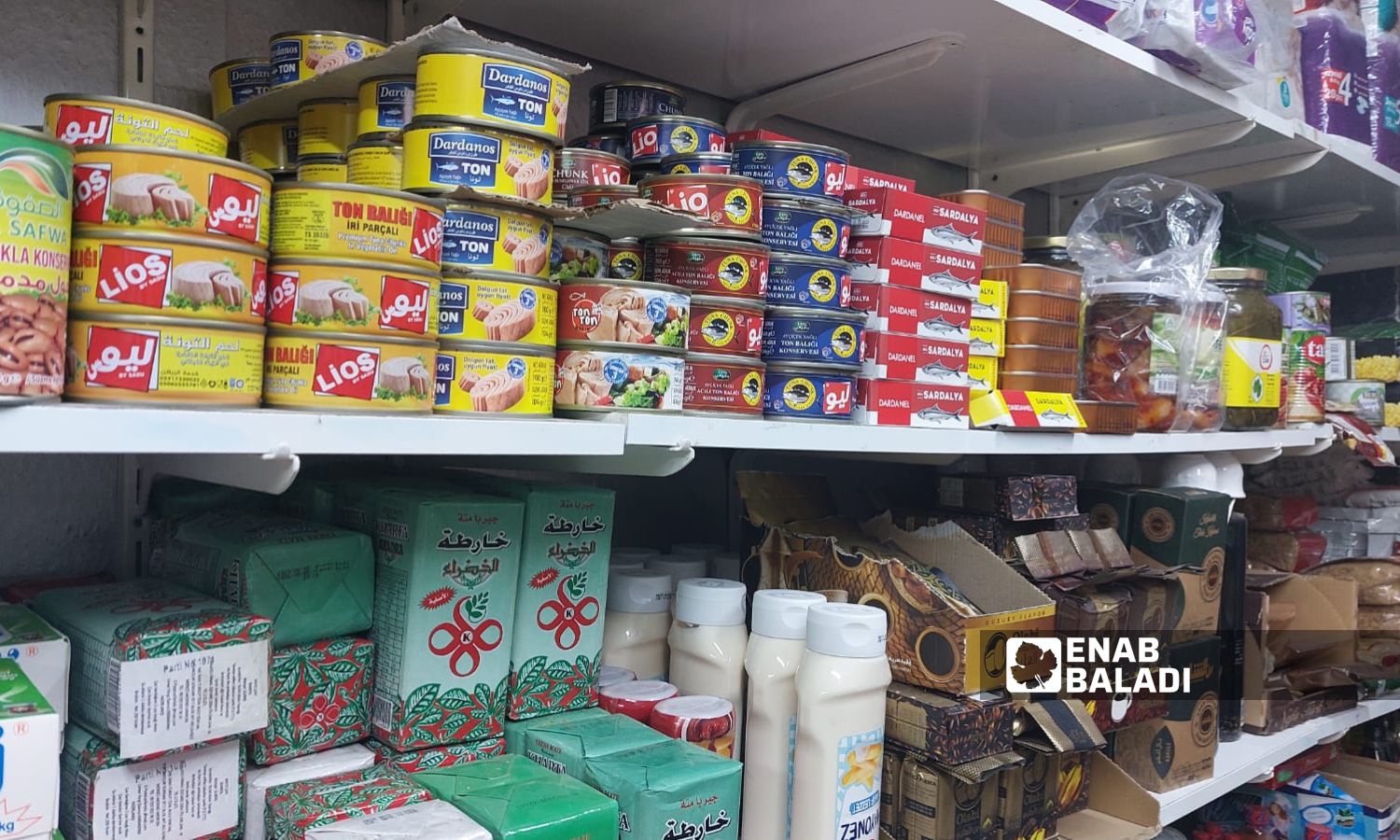



Enab Baladi – Hussam al-Mahmoud
Over time, Syrian grocery stores in Turkey have expanded their capabilities to meet the needs of their customers. The owners have transitioned from selling Syrian goods and those products that Syrians can only find in their stores, to offering various paid services unrelated to the typical grocery store operations, with a noticeable price difference for the same goods between Syrian and Turkish stores.
While the Syrian grocery stores began more than a decade ago, following the influx of refugees to Turkey, by selling essential Syrian goods like bread, Syrian coffee, and mate that many refugees cannot do without, they soon expanded their inventory to include Turkish goods as well, although at non-competitive prices.
Enab Baladi observed a disparity in the prices of some products displayed in Turkish and Syrian stores, with some of these goods being notably more expensive in the Syrian grocery stores compared to Turkish stores.
Ahmed, a young Syrian who owns a grocery store in the European part of Istanbul, attributed this situation to the method of obtaining products. Large Turkish stores like BIM and A101 are extensive, multi-branch commercial institutions that sell products across Turkey, which explains how they obtain goods at lower prices and sell them to consumers at state-subsidized prices. In contrast, the Syrian grocery stores get their products from wholesalers offering relatively higher prices.
Regarding price monitoring mechanisms by the Turkish government, Ahmed mentioned that regulatory authorities visit Syrian stores only once or twice a year to check general conditions, cleanliness, and posted prices of goods without intervening in the pricing itself.
In many Syrian grocery stores, there is an old, worn-out notebook filled with lines, scratches, and old pages yet to be resolved. This is the debt notebook that these grocery stores rely on, despite some openly decrying debt but eventually accepting its inevitability to attract customers.
The working conditions and necessity of opening and closing this debt record varied between Syria and abroad. In Syria, debt accounts were typically opened by heads of households who often lived in the same neighborhood as the grocery store. Nowadays, they are often opened by the younger generation, who wait for their monthly wages to repay their debts or part of them to the store owner. The store’s acquaintance with the debtor is often limited to a first name and a mobile number, leading to a greater risk of fraud, as mentioned by a store owner to Enab Baladi. He pointed out his increased caution regarding debt, selling only to specific customers whose purchasing behavior and financial capabilities he knew from their buying patterns.
These grocery stores also function as social hubs where conversations about the conditions of Syrians in Turkey are shared. Syrians discuss part of their concerns about travel and the desire to emigrate, often involving converting Turkish lira to dollars to save funds for travel or migration from Turkey.
Besides the debt notebook, which could be a lure for some customers, these grocery stores offer services like transferring money to Syria, with delivery through offices or by hand, currency exchange from Turkish lira to US dollars, extracting government documents, registering mobile phones on the Turkish network, selling smuggled tobacco at lower prices compared to official Turkish tobacco, and selling herbs and technological accessories like phone chargers and headphones.
The price disparity, although relatively acceptable in certain contexts, appeared excessive for some luxury items observed by Enab Baladi in both Turkish and Syrian stores. For instance, Turkish stores offer promotions on perfumes, razors, and skincare creams that do not require a special prescription, at reasonable or relatively low prices. In contrast, some Syrian grocery stores sell the same items at double or triple the Turkish stores’ prices.
Eyad, a young Syrian living in Istanbul, told Enab Baladi that as a Syrian customer, his purchases are divided between the large Turkish stores mentioned earlier and the small Syrian grocery stores. The significant price difference pushes him to buy specific products from the Syrian grocery stores, like Syrian bread, coffee, mate, and olive oil.
He also noted that there are encouraging offers in Turkish stores absent in Syrian grocery stores, relying mainly on Syrian groceries for purchasing bread or reasonably priced Syrian pastries or sweets like Maamoul.
“I never bought rice or sugar from a Syrian grocery store, relying primarily on Turkish stores,” Eyad added.
Economic researcher Adham Qudaimati previously told Enab Baladi that the contents of the grocery stores have expanded over time. Previously containing basic and food products, the stores now also include other items, classifying the Syrian grocery stores more as markets or mini-markets, as they offer non-food items typical of a general store.
Many products previously produced in Syria have now moved their factories to Turkey, providing products after paying taxes and economic duties, attracting some Turkish customers to buy from Syrian grocery stores.
The minimum wage in Turkey, announced by the Minister of Labor and Social Security Vedat Işıkhan on December 27, 2023, with an increase of about 49%, is 17,002 Turkish liras, up from 11,402 liras.
The exchange rate of the US dollar to the Turkish lira is 32.8 Turkish liras per US dollar, according to the Doviz website specializing in currency exchange rates.
Approximately 530,000 Syrians reside in Istanbul under temporary protection law, according to the Turkish Anadolu Agency, quoting the Istanbul Migration Management Directorate on June 21.
The Turkish Presidency of Migration Management announced in May last year a statistic showing the number of registered Syrian refugees in Turkey has declined to its lowest level since 2017, totaling 3,115,536 people, as reported by the Turkish Refugees organization.
The decline in the value of the Turkish lira affects the living standards of both Turkish citizens and Syrians in Turkey, as well as the northern Syrian regions that use the Turkish lira as their market currency.
if you think the article contain wrong information or you have additional details Send Correction